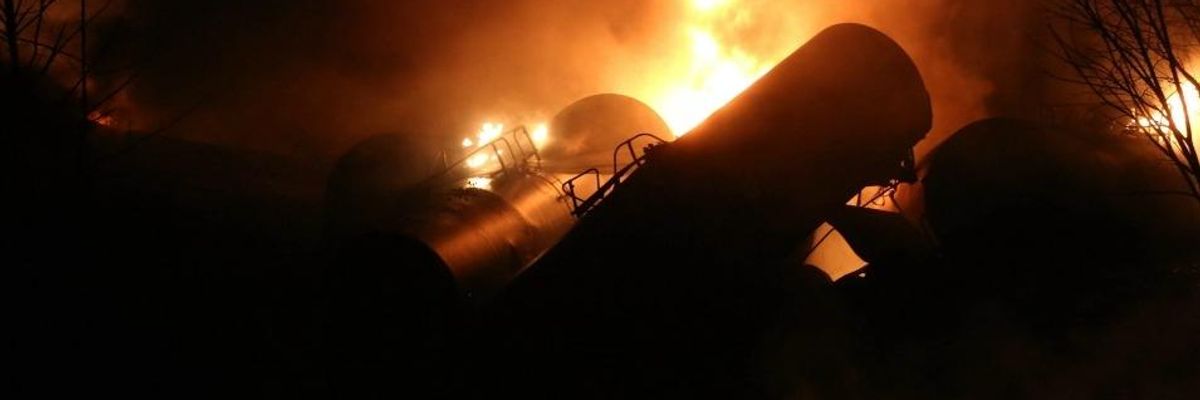As children across the country head back to school this week, a new report from public interest group ForestEthics reveals that 14,800 schools and 5.7 million students are within the "oil train blast zone"--the area that must be evacuated in case of a derailment or fire from an oil train.
Using its Blast Zone map, released last year, and data from the Department of Education, ForestEthics identified the five U.S. cities with the greatest numbers of students at risk from a potential oil train derailment and explosion: Houston, Philadelphia, Chicago, Los Angeles, and El Paso.
"The federal government needs to protect the millions of students sitting in classrooms inside the blast zone," said Matt Krogh, extreme oil campaign director for ForestEthics, which is calling for a moratorium on oil trains in the absence of publicly available information about their routes, their contents, and their safety.
Massive growth of oil train traffic--over 5,000 percent since 2008 in the U.S.--has led to more derailments, oil spills into waterways, and massive explosions. This year alone has seen five explosive derailments in the U.S. and Canada. In 2013, 47 people died when an oil train crashed and exploded in the small Canadian town of Lac-Megantic.
In May, the Department of Transportation unveiled new oil-by-rail safety standards, which included a phase-out of particularly old and dangerous cars, as well as new mandates for thicker steel walls, tougher valves, and in some cases, electronically controlled brakes. Environmental groups were joined by some elected officials in saying the new rules didn't go far enough.
David Turnbull, campaigns director of Oil Change International, described the new regulations as "yet another indication of how dangerous energy policies written by and for Big Oil are for our communities and our climate."
"These weak regulations allow the industry to continue endangering communities with bomb trains that facilitate hazardous expansion of the oil industry," Turnbull said at the time.
A separate analysis released last week by the Center for Biological Diversity (CBD) showed that more than 1 million California students attend school within a mile of confirmed oil train routes, and of those, roughly 521,000 go to school within a half-mile of oil train routes--the area that federal officials say should be initially evacuated in all directions in case of a single tanker on fire.
"Railroad disasters shouldn't be one of the 'three Rs' on the minds of California school kids and their parents," said Valerie Love of CBD. "Oil trains have jumped the tracks and exploded in communities across the country. These dangerous bomb trains don't belong anywhere near California's schools or our children."
The analyses underscore the importance of transparency around oil trains--transparency that has so far been non-existent.
"[W]e don't even know the details on the dangers of these trains--and neither do our first responders or our elected leaders," says ForestEthics in a call to action. "We don't know because oil train companies like BNSF, Union Pacific, CSX, Norfolk Southern, Canadian Pacific and Canadian National are keeping four critical types of information hidden." According to the group, those are:
- The routing choices they make through cities, towns and sensitive areas;
- The worst case scenario models they create for your town;
- The insurance amount they have to cover themselves; and
- Their emergency response plans when the unthinkable happens.
ForestEthics has dubbed these documents "The Oil Train Secrets" and is calling for their public release.
"The Federal Railroad Administration and the railroads need to release hidden documents that detail the routing choices they make through cities, towns and sensitive areas," said Krogh. "Railroads have created worst case scenario models that determine the billions of dollars of insurance that they carry for when the unthinkable happens. Communities and first responders must have access to these documents, to emergency response plans, and to notification of exactly when and where oil trains are running, in order to gauge the risks for themselves."

